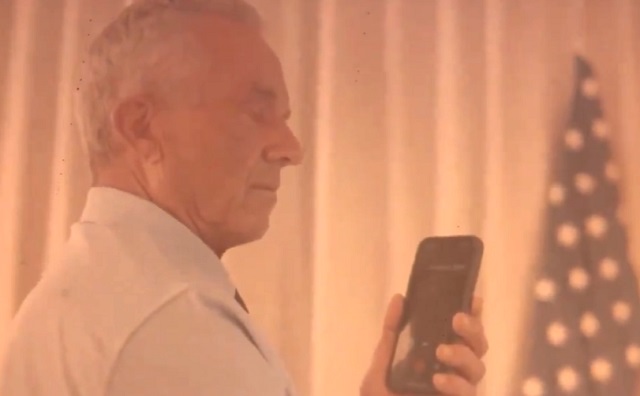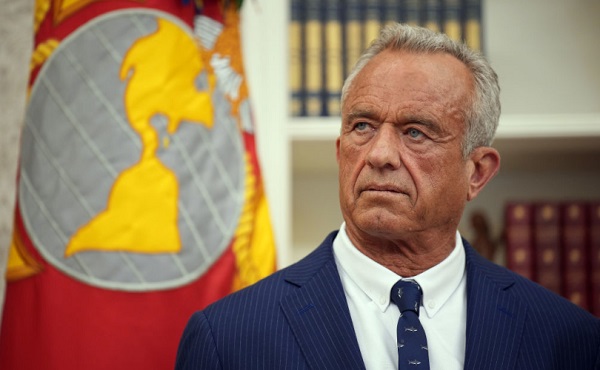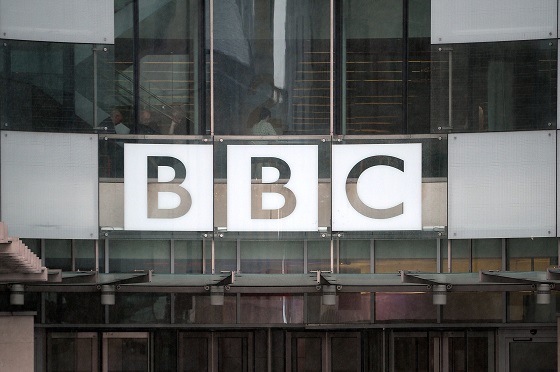Health
Leaked footage shows Trump questioning childhood vaccines in phone call with RFK Jr.

Robert F. Kennedy Jr. speaks with Donald Trump.
From LifeSiteNews
The former president appears to admit that childhood vaccination can lead to injuries during a Sunday phone call with Robert Kennedy Jr., the footage of which was originally leaked by Kennedy’s son.
The son of independent presidential candidate Robert F. Kennedy Jr. recently leaked footage online of his father’s phone call with Donald Trump during which the former president questioned childhood vaccines.
Holy cow. Leaked RFK Jr. call with Trump, talking about vaccines. I hope Trump puts him in charge of shutting down the CDC, FDA corruption.
— Liz Wheeler (@Liz_Wheeler) July 16, 2024
At the beginning of the video clip, Trump can be heard saying, “I agree with you, man. Something’s wrong with that whole system, and it’s the doctors you find. Remember I said, ‘I want to do small doses.’”
“When you feed a baby, Bobby, a vaccination that is like 38 different vaccines, and it looks like it’s meant for a horse, not a, you know, 10-pound or 20-pound baby … and then you see the baby all of a sudden starting to change radically. I’ve seen it so many times,” Trump continued.
“And then you hear that it doesn’t have an impact, right? But you and I talked about that a long time ago,” the former president added.
The leaked footage shows that Trump holds to a stance of skepticism about childhood vaccination that he was publicly known for before the COVID shot rollout under his administration’s Operation Warp Speed. For example, in 2017, Trump was criticized for a statement he made in 2015 linking vaccines to autism: “People that work for me, just the other day, two years old, beautiful child went to have the vaccine and came back and a week later, got a tremendous fever, got very, very sick, now is autistic,” Trump said at the time.
In 2014, Trump tweeted, “Healthy young child goes to doctor, gets pumped with massive shot of many vaccines, doesn’t feel good and changes – AUTISM. Many such cases!”
Kennedy’s son, Robert F. Kennedy III, who posted the footage online early on Tuesday, reportedly said in his X post that he wanted to show Trump’s “real opinion” on vaccination, but has since deleted the clip, according to the BBC.
It is noteworthy that while Trump admits that at least certain doses and kinds of childhood vaccines lead to autism and potentially other health problems, he has consistently defended Operation Warp Speed’s rollout of novel “vaccine” technology in the face of grievances that it has caused many deaths and serious health issues. Since leaving office, he repeatedly promoted the jab as “one of the greatest achievements of mankind.” In January 2023, he dismissed potential safety issues by suggesting that “problems” were in “relatively small numbers.”
It is little discussed, however, that while Operation Warp Speed was technically an initiative of the Trump administration, a significant number of the players involved clashed with the White House, as Politico has revealed. In fact, White House Coronavirus Task Force members were reported to have been excluded from early Warp Speed discussions.
A former White House official involved in the task force says they were “blindsided” by this exclusion, according to Politico. “They wouldn’t brief the task force on it … (just) a private briefing,” the official said at the time.
Politico further revealed that Operation Warp Speed was the brainchild of Health and Human Services Secretary Alex Azar, “who was often at odds with the White House.” His advisory board included NIH director Francis Collins and NIAID director Anthony Fauci, and his plan won the support of White House senior adviser Jared Kushner as well as White House Chief of Staff Mark Meadows.
Kennedy is known for vehemently opposing vaccines, a stance he adopted after the mothers of vaccine-injured children implored him to look into the research linking thimerosal to neurological injuries, including autism. He went on to found Children’s Health Defense, an organization with the stated mission of “ending childhood health epidemics by eliminating toxic exposure,” largely through vaccines.
Trump appears to invite Kennedy to support his presidential campaign during their phone call on Sunday.
“I would love you to do something,” Trump can be heard saying in the video footage. “And I think it’ll be so good for you and so big for you. And we’re going to win.”
Trump also brought up Saturday’s assassination attempt, telling Kennedy that the bullet that pierced his ear “felt like a giant – like the world’s largest mosquito.”
After the video clip of their conversation made the rounds online, Kennedy apologized on Tuesday for its public posting, writing on X, “When President Trump called me, I was taping with an in-house videographer,” he wrote. “I should have ordered the videographer to stop recording immediately. I am mortified that this was posted.”
When President Trump called me I was taping with an in-house videographer. I should have ordered the videographer to stop recording immediately. I am mortified that this was posted. I apologize to the president.
— Robert F. Kennedy Jr (@RobertKennedyJr) July 16, 2024
armed forces
Why Do Some Armed Forces Suffer More Suicides Than Others?

Any single suicide is an unspeakable tragedy. But public health officials should be especially alarmed when the numbers of suicides among a particular population spike. Between 2019 and 2023, the suicide rate across Canada fell from 12.3 per 100,000 to 9.5 per 100,000. U.S. numbers aren’t that different (although they’re heading in the other direction).
Holding public officials and institutions accountable using data-driven investigative journalism.
Against this context, the suicide rate among active Canadian military personnel is truly alarming. Data included in a 2021 Report on Suicide Mortality in the Canadian Armed Forces (CAF) showed that the three year moving average annual rate for suicides in all services of the CAF was 23.38 per 100,000 – around twice the national rate. Which, of course, is not to ignore the equally shocking suicide rates among military veterans.
This isn’t specific to Canada. All modern military communities have to worry about numbers like those. Officials in the Israel Defense Force – now hopefully emerging from their longest and, by some measures, costliest war ever – are struggling to address their own suicide crisis. But there’s a significant difference that’s probably worth exploring.
Through 2024, 21 active duty IDF soldiers took their own lives. This dark number has justifiably inspired a great deal of soul searching and, naturally (it being Israel), finger pointing. But the real surprise here is how low that number is.
It’s reasonable to estimate that there were 170,000 active duty soldiers in the IDF during 2024 and another 300,000 active reservists. If you count all of those together, the actual suicide rate is just 4.5 per 100,000 – which is less than half of the typical civilian suicide rate in Western countries!
Tragic. But hardly an epidemic. Those soldiers have all lost friends and faced battlefield conditions that I, for one, find impossible to even comprehend. And those 300,000 reservists? They’ve been torn away from their families, businesses, and normal lives for many months. Many have suffered devastating financial, social, and marital pressures. And still: we’re losing them at lower rates than most civilian populations!
Is there any lesson here that could help inform CAF policy?
One obvious difference is sense of purpose: IDF members are fighting for the very existence of their people. They all saw and felt the horrors of the October 7 massacres and know that there are countless thousands of adversaries who would be happy do it again in a heartbeat¹. And having a general population that overwhelmingly supports their mission can only help that sense.
But there are some other factors that could be worth noting:
- The IDF is unusual in that it subjects all potential conscripts to mandatory psychological screening – resulting in many exemptions.
- Small, stable units are intentionally kept together for years. In fact, units are often formed from groups who have known each other since their early school years. This cohesion also helps with post-service integration.
- Every IDF battalion has a dedicated officer trained in brief interventions and utilization rates are high.
Is there anything here that CAF officials could learn from?
Health
RFK Jr. urges global health authorities to remove mercury from all vaccines

From LifeSiteNews
Health and Human Services (HHS) Secretary Robert F. Kennedy Jr. is urging health leaders across the planet to stop including mercury in vaccinations.
“Now that America has removed mercury from all vaccines, I call on every global health authority to do the same — to ensure that no child, anywhere in the world, is ever exposed to this deadly neurotoxin again,” he said.
Kennedy’s comments came in a video he recorded for the Minamata Convention on Mercury. The event is an international gathering aimed at preventing human contact with mercury, which, according to the World Health Organization (WHO), is one of the top 10 chemicals of major public health concern. The treaty, backed by the United Nations (UN), was first signed in 2013 by over 140 countries.
Kennedy noted that while the group’s goal is no doubt praiseworthy, it has not gone far enough in its efforts.
“Article 4 of the convention calls on parties to cut mercury use by phasing out listed, mercury-added products. But in 2010, as the treaty took shape, negotiators made a major exception. Thimerosal-containing vaccines were carved out of the regulation,” he recalled.
“The same treaty that began to phase out mercury in lamps and cosmetics chose to leave it in products injected into babies, pregnant women, and the most vulnerable among us,” he noted. “We have to ask: Why? Why do we hold a double standard for mercury? Why call it dangerous in batteries, in over-the-counter medications, and make-up but acceptable in vaccines and dental fillings?”
This past summer, Kennedy’s Advisory Committee for Immunization Practices launched a study to research the vaccine schedule for children. Among other recommendations, the committee advised the removal of thimerosal, a neurotoxic, mercury-containing preservative that had been used in flu shots.
Kennedy noted in his video message that “thimerosal’s own label requires it to be treated as a hazardous material and warns against ingestion,” adding that “there is not a single study that proves it’s safe. That’s why in July of this year the United States closed the final chapter on the use of thimerosal as a vaccine preservative, something that should have happened years ago.”
Kennedy further explained that thimerosal is “a potent neurotoxin, a mutagen, a carcinogen, and an endocrine disrupter” while noting that “safe alternatives” already exist.
“Manufacturers have confirmed that they can produce mercury-free, single dose vaccines without interrupting supply. There is no excuse for inaction or holding stubbornly to the status quo,” he exclaimed. “Now that America has removed mercury from all vaccines, I call on every global health authority and every party to this convention to do the same.”
“Let’s honor and protect humanity, and our children, and creation from mercury,” he concluded.
The Minamata Convention on Mercury went into effect in August 2017. It was initially approved by the Intergovernmental Negotiating Committee in Geneva, Switzerland, in January 2013. It was adopted in October 2013 at a Diplomatic Conference in Kumamoto, Japan. Per its website, it is named “after the bay in Japan where, in the mid-20th century, mercury-tainted industrial wastewater poisoned thousands of people, leading to severe health damage that became known as the ‘Minamata disease.’”
-

 Business1 day ago
Business1 day agoCBC cashes in on Carney as the news industry playing field tilts further in its favour, crippling the competition
-

 Agriculture5 hours ago
Agriculture5 hours agoBovaer Backlash Update: Danish Farmers Get Green Light to Opt Out as UK Arla Trial Abruptly Ends!
-

 Business10 hours ago
Business10 hours agoCarney’s Floor-Crossing Campaign. A Media-Staged Bid for Majority Rule That Erodes Democracy While Beijing Hovers
-

 Agriculture1 day ago
Agriculture1 day agoFarmers Take The Hit While Biofuel Companies Cash In
-

 Daily Caller19 hours ago
Daily Caller19 hours agoMcKinsey outlook for 2025 sharply adjusts prior projections, predicting fossil fuels will dominate well after 2050
-

 Business19 hours ago
Business19 hours agoTrump: Americans to receive $2,000 each from tariff revenue
-

 Agriculture1 day ago
Agriculture1 day agoWas The Ostrich “Cull” A Criminal Act?
-

 International19 hours ago
International19 hours agoBBC boss quits amid scandal over edited Trump footage





